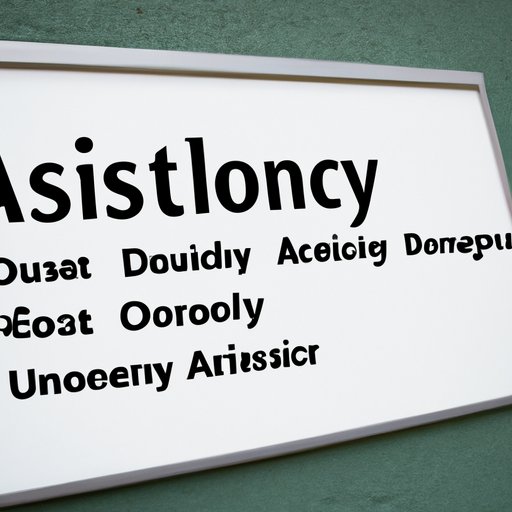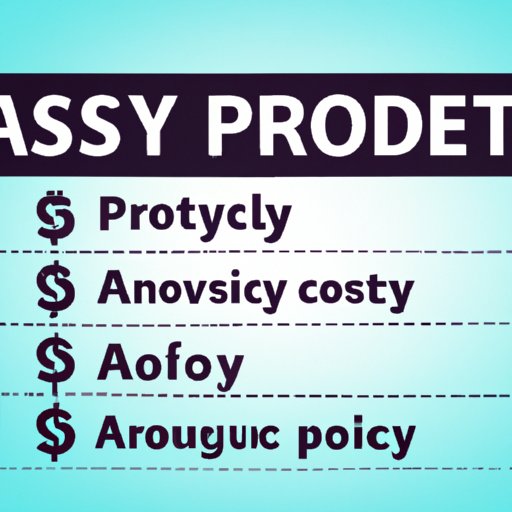Introduction
An autopsy is a medical procedure that involves a detailed examination of a deceased person’s body to determine the cause of death. Autopsies are performed by medical professionals such as pathologists and forensic specialists who use specialized tools to examine the remains both internally and externally. In some cases, an autopsy may also involve laboratory tests and toxicology screenings.
When it comes to cost, there are a few key considerations to keep in mind. Factors such as the type of autopsy, the location, and the facility performing the autopsy all have an impact on the final price. In this article, we look at how much an autopsy typically costs and what you should know about budgeting for one.

Exploring the Cost of Autopsy Services: A Breakdown
The cost of an autopsy depends on a variety of factors. To determine the exact price, you will need to contact a local medical examiner or pathology lab. Generally speaking, autopsies can range from $500 to $3,000 or more, depending on the complexity of the procedure. Additional costs may also include charges for travel, lodging, and other associated expenses.
Determining Factors Affecting Autopsy Costs
The cost of an autopsy may vary depending on the specific circumstances. For example, if the autopsy requires additional laboratory tests or if the body needs to be transported to a different location, these costs will be factored into the total price. In addition, the type of autopsy being performed will also have an impact on the cost. Common types of autopsies include forensic autopsies, hospital autopsies, and private autopsies.
Typical Autopsy Fees
According to a study conducted by the University of Michigan Medical School, the average cost of an autopsy ranges from $1,200 to $2,000. This includes the fee for the autopsy itself, as well as any associated laboratory tests. It is important to note that additional fees may apply, such as those for transportation, lodging, and other associated expenses.

How to Budget for an Autopsy
When budgeting for an autopsy, it is important to take into account the cost of the procedure itself, as well as any additional fees that may be incurred. Additionally, it is important to understand your payment options and what insurance coverage may be available. Here are a few tips to help you prepare for the financial aspects of an autopsy.
Understanding Payment Options
Most medical examiners and pathology labs accept payment in the form of cash, check, or credit card. Additionally, some facilities may offer payment plans or discounts for certain services. It is important to speak with the facility directly to find out what payment options are available.
Tips for Lowering Autopsy Costs
There are a few ways to reduce the cost of an autopsy. First, try to find a facility that is willing to negotiate on fees. Second, if possible, request that the autopsy be performed in a public facility, which may offer lower rates than a private facility. Finally, ask if any additional fees, such as those for travel or lodging, can be waived.
An Overview of Autopsy Costs and Fees
When considering the cost of an autopsy, it is important to factor in all of the associated fees. Here is a brief overview of some of the most common types of autopsies and their associated costs.
Types of Autopsies
Forensic autopsies are typically used in criminal cases and usually involve complex procedures such as toxicology screenings and tissue sampling. These autopsies are often the most expensive, ranging from $3,000 to $5,000. Hospital autopsies are typically used to investigate medical errors or unexplained deaths and usually cost between $1,500 and $2,500. Private autopsies are typically requested by families for personal reasons and can range from $500 to $1,500.
Additional Expenses to Consider
In addition to the cost of the autopsy itself, there may be additional expenses that need to be taken into account. These can include travel and lodging costs, as well as fees for laboratory tests, toxicology screenings, and tissue sampling. Depending on the circumstances, these costs can significantly increase the overall price of the procedure.

What You Should Know About Autopsy Prices
When it comes to autopsy prices, there are a few key things to keep in mind. The type of autopsy, the location, and the facility performing the autopsy all have an impact on the final cost. Additionally, it is important to consider any additional fees that may be incurred, such as travel and lodging expenses. It is also important to understand the payment options available and to research pricing prior to scheduling the procedure.
Variables that Impact Autopsy Costs
The cost of an autopsy can vary greatly depending on the specific circumstances. Factors such as the type of autopsy, the location, and the facility performing the autopsy all have an impact on the final cost. Additionally, additional fees such as those for travel and lodging can significantly increase the overall price of the procedure.
Researching Autopsy Pricing
When researching autopsy pricing, it is important to compare prices from multiple providers. Additionally, it is important to inquire about any additional fees that may be incurred, such as those for travel and lodging. Finally, it is important to understand the payment options available and to ask if any discounts or payment plans are offered.
The Price of Autopsies: What to Expect
When it comes to the cost of an autopsy, there are a few key factors to consider. Generally speaking, autopsies can range from $500 to $3,000 or more, depending on the complexity of the procedure. Additionally, additional fees such as those for travel and lodging can significantly increase the overall price. It is important to understand the payment options available and to research pricing prior to scheduling the procedure.
Understanding the Cost of Autopsies
The cost of an autopsy can vary significantly depending on the type of autopsy being performed, the location, and the facility performing the autopsy. It is important to take into account all of the associated fees, including those for travel, lodging, and laboratory tests. Additionally, it is important to understand the payment options available and to inquire about any discounts or payment plans that may be offered.
Potential Savings on Autopsy Costs
There are a few ways to potentially save on autopsy costs. For example, try to find a facility that is willing to negotiate on fees, or request that the autopsy be performed in a public facility, which may offer lower rates than a private facility. Additionally, ask if any additional fees, such as those for travel or lodging, can be waived.
Conclusion
Autopsies can be expensive and the costs vary depending on a range of factors. It is important to understand the payment options available and to research pricing prior to scheduling the procedure. Additionally, there are a few ways to potentially save on autopsy costs, such as negotiating on fees or requesting that the autopsy be performed in a public facility. By understanding the cost of an autopsy and budgeting appropriately, you can ensure that you receive the best possible care.
(Note: Is this article not meeting your expectations? Do you have knowledge or insights to share? Unlock new opportunities and expand your reach by joining our authors team. Click Registration to join us and share your expertise with our readers.)
